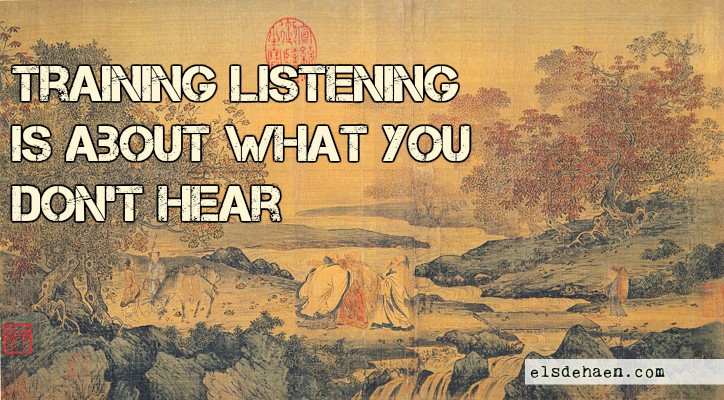“A pot is useful not for what you can see. It is useful for what you cannot see — its emptiness.” — Lao-Tzu
Yes, only total posers start off a language learning article with a Taoist quote, but bear with me for a bit.
I was inspired to write this post by a class I taught last week. I wanted to do a dictation, a teaching technique where you write down sentences exactly as you hear them. Dictations might remind you of the wondrous time you spent in primary school (an age where all learning was so fascinating and new. At age 9, I was so obsessed with doing long divisions that I constantly asked my mother to write down numbers so I could divide them. After a while, she got me a book with extra exercises and it was like Christmas had come early… but I digress.)
I announce it’s time for a dictation roughly twice every semester. Surprisingly, students are generally not as enthusiastic as I am about dictations.
Well, that’s not really that surprising because:
- I am really enthusiastic about dictations. But like, REALLY enthusiastic. I might love them more than long divisions.
- It’s a laborious task. My students (level B1, intermediate) need approximately 5 to 10 minutes to transcribe a 20 seconds recording. Many feel it’s cumbersome and not worth the effort.
- Doing something that identifies gaps in your knowledge makes some people feel inadequate. Shocker: people don’t like feeling dumb. Alert the media.
Of course #3 is the real issue here.
Many students prefer to get separate chunks of grammar and vocabulary they can study and then reproduce for a test so they can show the world how smart they are. I feel you. I’m exactly the same. Acing tests is awesome. Unfortunately, this is not the fastest route.
It is my firm belief that the more ‘dumb’ you allow yourself to feel while using your target language, the faster and easier you will learn. It’s why babies are crazy strong language machines. Think about it, what’s the easiest way to identify gaps in your knowledge? Is it studying the random vocabulary lists (animals, food, transport, you name it) your teacher gives you, hoping some or most of them will be unknown to you and broaden your range? Or is it reading or listening to an authentic text and trying to make sense of the abundance of integrated input you received? (Note: this is a bit of a trick question, as the ideal student does both.)
Still sceptic? Let’s look at what we did in class.
The warriors of Mount Kilimanjaro
If you want to try for yourself, transcribe this recording (the part we looked at starts at 00:48 and takes about 20 seconds). You can also look at the full text by highlighting the white space below.
In the shadows of Mount Kilimanjaro, warriors are warming up.
They’re competing in the Maasai Olympics.
The event was brought about to discourage the traditional practice of hunting, which has taken the local lion population to the brink of extinction.
The games will allow young men to showcase their skills and also preserve the big cats.
Some students were kind enough to allow me to take a photo of their final try before we looked at it together:

It’s not super legible but you get the picture. What’s so interesting about these is that they immediately show what is difficult for the individual student. Very often that boils down to:
- Words they didn’t know before (‘worries’ instead of ‘warriors’, ‘to bring in extension’/’to the bring of extinction’ instead of ‘to the brink of extinction)
- Grammar that is different in their own language (‘event’ instead of ‘the event’, ‘the big cat’ instead of the big cats’)
This interests me greatly. Here’s why: what students can’t hear, they generally don’t tend to use while speaking either.
Like with vision, we don’t just hear with our ears, we hear with our brain. Articles (‘a’, ‘an’ and ‘the’) are often overlooked by speakers of languages that don’t have articles (Chinese, Japanese, Russian, Polish, to name a few). Articles are often not stressed in English and are easy to miss. Speakers of Dutch, a language with articles, expect something to be there, so they will generally pick up on it however silent and subtle it is. But it’s extremely hard to listen for something that you don’t expect to be necessary to form a correct sentence.
Doing a dictation every so often creates awareness. Awareness creates expectations for ‘something’ to be there. Expectations make it easier to hear that something and in the end, makes it easier to speak correctly too.
Anyway, don’t take my word for it, but enjoy some more of Lao-Tzu’s wisdom:
Thirty spokes are joined together in a wheel,
but it is the center hole
that allows the wheel to function.
We mold clay into a pot,
but it is the emptiness inside
that makes the vessel useful.
We fashion wood for a house,
but it is the emptiness inside
that makes it livable.
We work with the substantial,
but the emptiness is what we use.

Your English is so beautiful that I should read your article a second time to get your message.
LikeLiked by 1 person
Very true! It rings a bell with me in my own teaching experience. We are less open to new things than we think when learning a language (or living in general). We are attracted to what is already known. In Swedish we call it “igenkännandets glädje” – “the joy of recognizing”.
LikeLike
Brilliant!
LikeLike